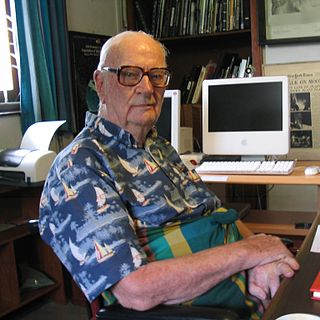
Hard science fiction is a category of science fiction characterized by concern for scientific accuracy and logic. The term was first used in print in 1957 by P. Schuyler Miller in a review of John W. Campbell's Islands of Space in the November issue of Astounding Science Fiction. The complementary term soft science fiction, formed by analogy to hard science fiction, first appeared in the late 1970s. The term is formed by analogy to the popular distinction between the "hard" (natural) and "soft" (social) sciences, although there are examples generally considered as "hard" science fiction such as Isaac Asimov's Foundation series, built on mathematical sociology. Science fiction critic Gary Westfahl argues that neither term is part of a rigorous taxonomy; instead they are approximate ways of characterizing stories that reviewers and commentators have found useful.
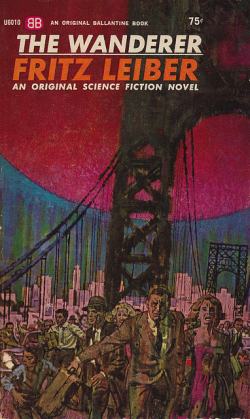
The Wanderer is a science fiction novel by American writer Fritz Leiber, published as a paperback original by Ballantine Books in 1964. It won the 1965 Hugo Award for Best Novel.

Robert Shaw was a science fiction writer and fan from Northern Ireland, noted for his originality and wit. He won the Hugo Award for Best Fan Writer in 1979 and 1980. His short story "Light of Other Days" was a Hugo Award nominee in 1967, as was his novel The Ragged Astronauts in 1987.

Sam Youd was a British writer best known for science fiction written under the name of John Christopher, including the novels The Death of Grass, The Possessors, and the young-adult novel series The Tripods. He won the Guardian Children's Fiction Prize in 1971 and the Deutscher Jugendliteraturpreis in 1976.

Andromeda: A Space-Age Tale is a science fiction novel by the Soviet writer and paleontologist Ivan Yefremov, written in 1955–1956 and published in 1957. It was translated into English as Andromeda: A Space-Age Tale by George Hanna. The novel predicted some future inventions. The German translation of the novel which was highly censored was serialized in the East German popular science magazine Jugend und Technik in 1958. It was made into a film in 1967, The Andromeda Nebula.
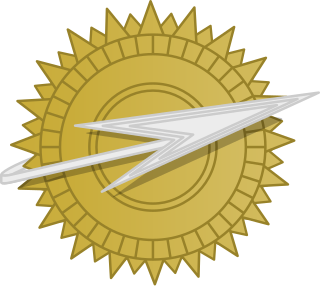
The Galactic Empire is an interstellar empire featured in Isaac Asimov's Robot, Galactic Empire, and Foundation series. The Empire is spread across the Milky Way galaxy and consists of almost 25 million planets settled exclusively by humans. For over 12 millennia the seat of imperial authority was located on the ecumenopolis of Trantor, whose population exceeded 40 billion, until it was sacked in the year 12,328. The official symbol of the empire is the Spaceship-and-Sun. Cleon II was the last Emperor to hold significant authority. The fall of the empire, modelled on the fall of the Roman Empire, is the subject of many of Asimov's novels.

Planetary romance is a subgenre of science fiction in which the bulk of the action consists of adventures on one or more exotic alien planets, characterized by distinctive physical and cultural backgrounds. Some planetary romances take place against the background of a future culture where travel between worlds by spaceship is commonplace; others, particularly the earliest examples of the genre, do not, and invoke flying carpets, astral projection, or other methods of getting between planets. In either case, it is the planetside adventures which are the focus of the story, not the mode of travel.
Eurocon is an annual science fiction convention held in Europe. The organising committee of each Eurocon is selected by vote of the participants of the previous event. The procedure is coordinated by the European Science Fiction Society. The first Eurocon was held in Trieste, Italy, in 1972. Unlike Worldcons, Eurocon is usually a title attached to an existing convention. The European SF Awards are given in most of the conventions giving recognition to the best works and achievements in science fiction.

Robinsonade is a literary genre of fiction wherein the protagonist is suddenly separated from civilization, usually by being shipwrecked or marooned on a secluded and uninhabited island, and must improvise the means of their survival from the limited resources at hand. The genre takes its name from the 1719 novel Robinson Crusoe by Daniel Defoe. The success of this novel spawned so many imitations that its name was used to define a genre, which is sometimes described simply as a "desert island story" or a "castaway narrative".

Saturn has made appearances in fiction since the 1752 novel Micromégas by Voltaire. In the earliest depictions, it was portrayed as having a solid surface rather than its actual gaseous composition. In many of these works, the planet is inhabited by aliens that are usually portrayed as being more advanced than humans. In modern science fiction, the Saturnian atmosphere sometimes hosts floating settlements. The planet is occasionally visited by humans and its rings are sometimes mined for resources.

Asteroids have appeared in fiction since at least the late 1800s, the first one—Ceres—having been discovered in 1801. They were initially only used infrequently as writers preferred the planets as settings. The once-popular Phaëton hypothesis, which states that the asteroid belt consists of the remnants of the former fifth planet that existed in an orbit between Mars and Jupiter before somehow being destroyed, has been a recurring theme with various explanations for the planet's destruction proposed. This hypothetical former planet is in science fiction often called "Bodia" in reference to Johann Elert Bode, for whom the since-discredited Titius–Bode law that predicts the planet's existence is named.
The fictional portrayal of the Solar System has often included planets, moons, and other celestial objects which do not actually exist in reality. Some of these objects were, at one time, seriously considered as hypothetical planets which were either thought to have been observed, or were hypothesized to be orbiting the Sun in order to explain certain celestial phenomena. Often such objects continued to be used in literature long after the hypotheses upon which they were based had been abandoned.
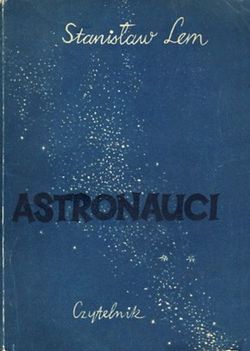
The Astronauts is the first science fiction novel by Polish writer Stanisław Lem published as a book, in 1951.

Milcząca Gwiazda, literal English translation The Silent Star, is a 1960 East German/Polish color science fiction film based on the 1951 science fiction novel The Astronauts by Polish science fiction writer Stanisław Lem. It was directed by Kurt Maetzig, and stars Günther Simon, Julius Ongewe and Yoko Tani. The film was first released by Progress Film in East Germany, running 93 min. Variously dubbed and cut versions were also released in English under other titles: First Spaceship on Venus, Planet of the Dead, and Spaceship Venus Does Not Reply.

Ancient astronauts have been addressed frequently in science fiction and horror fiction. Occurrences in the genres include:
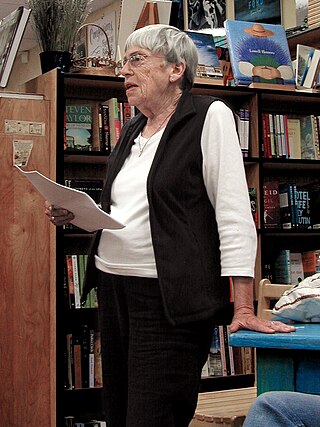
Soft science fiction, or soft SF, is a category of science fiction with two different definitions, defined in contrast to hard science fiction. It can refer to science fiction that explores the "soft" sciences, as opposed to hard science fiction, which explores the "hard" sciences. It can also refer to science fiction which prioritizes human emotions over the scientific accuracy or plausibility of hard science fiction.

The Ragged Astronauts is a novel by Bob Shaw published in 1986 by Gollancz. It is the first book in the series Land and Overland. It won the BSFA Award for Best Novel.

The following outline is provided as an overview of and topical guide to science fiction:

Space travel, or space flight is a classic science-fiction theme that has captivated the public and is almost archetypal for science fiction. Space travel, interplanetary or interstellar, is usually performed in space ships, and spacecraft propulsion in various works ranges from the scientifically plausible to the totally fictitious.
















